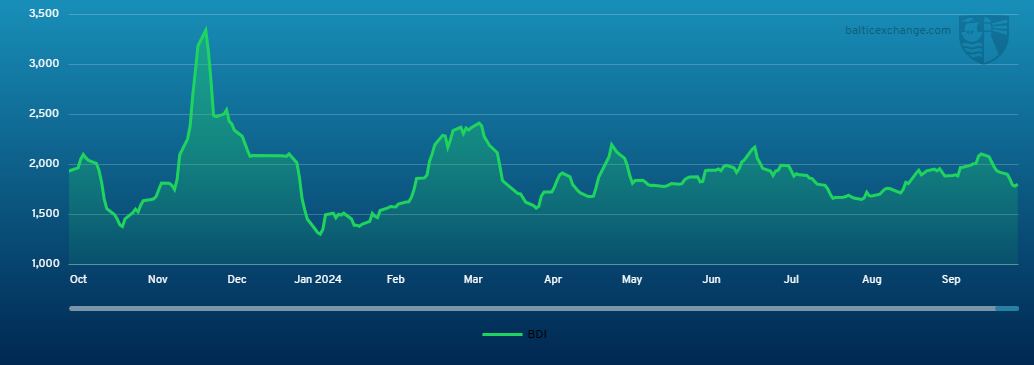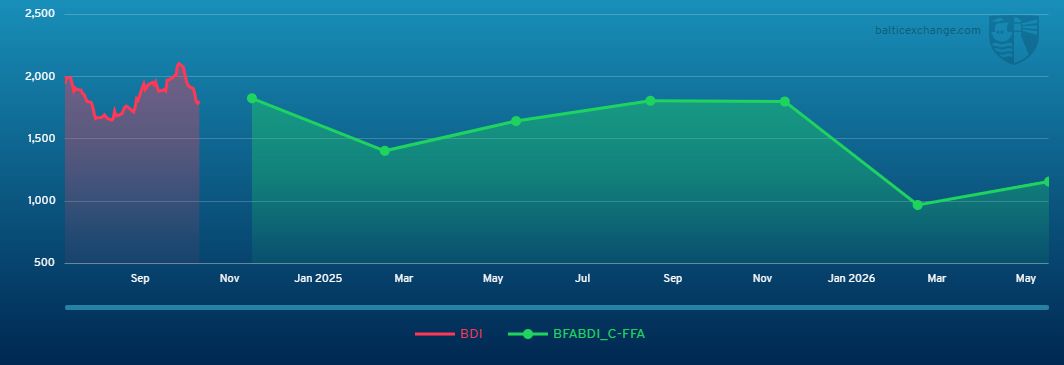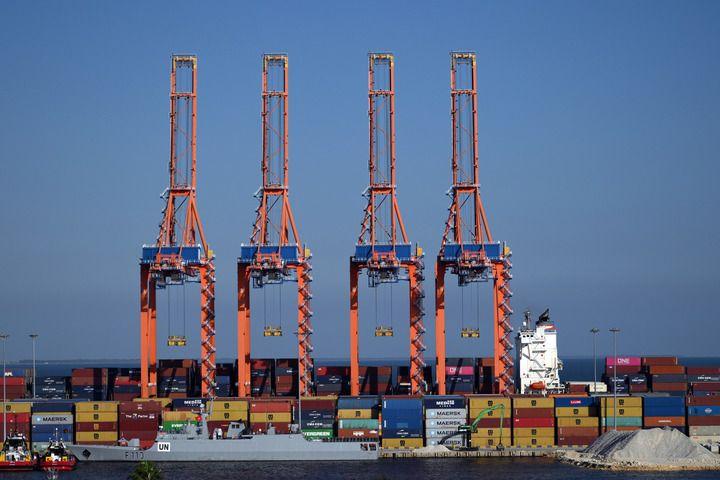BEIJING, Oct. 12 (Xinhua) -- The Baltic Exchange has published its weekly report of the dry and tanker markets for October 7-11, 2024 as below:
Capesize
The Capesize market faced a generally soft week with declining rates across the board. The BCI 5TC fell every day besides Friday, which closed at $23,509, a significant drop from Monday's $26,213. The Pacific market saw reduced miner activity, with C5 rates declining from the low $10's early in the week. Despite continued rate drops, particularly in the Atlantic, the pace of decline began to decrease. Increased coal cargoes offered some support in the Pacific, helping the C5 index nudge back up, ending the week after a couple of stronger fixtures at $10.025. The south Brazil and West Africa to China markets experienced more activity, but rates softened with C3 fixtures dipping into the low $25's by week's end. The north Atlantic also contributed to the weaker sentiment with fronthaul and trans-Atlantic rates decreasing steadily. Fronthaul fixtures dropped from around $52,000 on Monday with the C9 index ending the week at $48,250, while trans-Atlantic routes saw similar declines, there was a shift in sentiment resulting in C8 closing the week at $22,384.
Panamax
After a promising opening to the week, activities in the Panamax market slowly but surely became something of a grind as confidence eroded in both basins. The north Atlantic struggled for any momentum all week. South America saw a brief rally mid-week for end October arrival dates, with reports of an 81,000dwt achieving $14,250 delivery Haldia for a trip via EC South America redelivery Singapore-Japan. Following various holidays last week, Asia returned with a bang, particularly from Indonesia, with a surge of fresh demand creating quite a stir. $15,250 was achieved for said run on an 82,000dwt delivery Vietnam, which had reverted closer to $14,000 by Friday with smaller LME types locking in at cheaper levels. Aside from some NoPac grain stems evident, the longer round trips lacked support but hovered around the $14,000 mark. Period activity included unconfirmed reports of an 82,000dwt delivery Singapore fixing at $15,750 basis 10/14 months.
Ultramax/Supramax
A rather positional week was described by many. Whilst upward pressure was seen from the US Gulf, an Ultramax was rumoured to have fixed a fronthaul trip at around $27,000. Other areas lacked fresh impetus with limited fresh enquiry from the Mediterranean saw a slight easing on rates from the east Mediterranean, a 56,000dwt fixing delivery Iskenderun for a trip via Gulf of Aden to China in the mid-teens. The south Atlantic was described as balanced, a 61,000dwt fixing delivery Santos for a trans-Atlantic run at $15,000. With various holidays in the Asian arena, there was a positive start, but as the week closed this sentiment dropped away. A 55,000dwt fixing a trip from China to Bangladesh at $16,500 whilst further south a 61,000dwt open Koh Sichang fixed a trip to China's Taiwan in the mid $16,000s. There was activity in the Indian Ocean, although again it was rather positional, a 61,000dwt open South Africa fixing a trip to China at $18,500 plus $185,000 ballast bonus.
Handysize
The market this week saw minimal visibility activity across both basins. The rates were rather steady across the Continent and the Mediterranean with sentiment appearing positional. A 32,000dwt open Rotterdam fixed via Rouen to Atlantic Colombia at $9,000. In the U.S. Gulf, activity picked up with several fresh cargoes across various sizes, though negative sentiment kept rates relatively stable. On 13 October, it was reported that a 39,000dwt Fairless Hills, which is currently open for charter, was fixed for a fronthaul voyage from the U.S. East Coast at a rate of $20,000. Meanwhile, the south Atlantic showed positive momentum as new requirements entered the market, prompting owners to raise their offers as tonnage availability is tightening. On October 5, a 36,000dwt Monrovia, which is currently open for charter, was fixed for delivery in Maceió for a trip to the Continent carrying sugar, at a rate of $13,500. The rates on the Pacific side appeared rather stable this week, although the market felt more supported. A 40,000dwt vessel was fixed for delivery from Japan via the U.S. West Coast to Chittagong at a rate of $16,000.
Clean
LR2
LR's in the MEG held steadfast this week. TC1 plateaued at WS115 where it has been for several days, and for a run west on TC20 the index dipped $80,000 to just below $4.1m.
West of Suez, Mediterranean/East LR2's on TC15 shed 5% of its value dropping to $2.85m.
LR1
In the MEG, LR1's had yet another week of downward pressure. The TC5 index 55kt CPP AG/Japan was marked another 10.94 points down to WS125. By comparison, the index on a voyage west on TC8 remained flat around the $3.58m level.
On the UK-Continent, the TC16 market continued along its WS110 path without much sign of changing.
MR
MEG MR's managed to resurge optimistically this week. The TC17 index as a result was assessed 53.57 points firmer than last week and currently sits at WS231.43.
UK-Continent MR's bottomed out this week. TC2 currently sits at WS90 after a couple of days in the high WS80's mid-week, and TC19 followed as usual, reaching WS112.81 in the middle of the week to tick back up to WS114.88 at time of writing.
USG MR's continued their upward trend this week despite recent bad weather in the region. TC14 jumped another 25.35 points to WS222.14 with the Baltic TCE for the trip going up over the $30,000/ day. TC18 has done the same although to a slightly lesser extent, the index is marked at WS270 (+21.43) from last week. For a run down to the Caribbean on TC21, a 10% climb on freight levels has the index pegged at $1.15m.
The MR Atlantic Triangulation Basket TCE gained $4,760 to $33,473.
Handymax
In the Mediterranean, Handymax's had a welcome upturn, and as a result we saw TC6 jump 30 points to WS125.56. The Baltic TCE for TC6 is now back up out of the negative and up to $6,038 $/day round trip.
Up on the UK-Continent, the TC23 also shot up 26.67 points to WS136.67.
VLCC
The VLCC market took a turn downwards this week. The 270,000 mt Middle East Gulf to China trip eased 1.5 points to WS58 which gives a daily round-trip TCE of $36,206 basis the Baltic Exchange's vessel description.
In the Atlantic market, the rate for 260,000 mt West Africa/China dipped 2 points to WS61.22 (corresponding to a round voyage TCE of $39,940 per day), and the rate for 270,000 mt US Gulf/China dropped $50,000 to $8,495,000 (a daily round trip TCE of $42,463).
Suezmax
Suezmax rates eased this week. In West Africa, the 130,000 mt Nigeria/UK Continent voyage fell 16 points to WS89 (a daily round-trip TCE of $32,151). The TD27 route (Guyana to UK Continent basis 130,000mt) was assessed at WS90, down 18 points week-on-week, which translates into a daily round trip TCE of $32,500 basis discharge in Rotterdam. In the Mediterranean and Black Sea region, the rate for 135,000 mt CPC/Med had a 3-point reduction to WS97.25 (showing a daily TCE of $31,578 round-trip). In the Middle East, the rate for 140,000 mt Middle East Gulf to the Mediterranean (via the Suez Canal) gained another 2 points to WS104.
Aframax
In the North Sea, the rate for the 80,000 mt Cross-UK Continent fell 7 points to WS123.75 (translating to a daily round-trip TCE of almost $27,220 basis Hound Point to Wilhelmshaven).
In the Mediterranean market, the rate for 80,000 mt Cross-Mediterranean rocketed 36 points to WS185.28 (basis Ceyhan to Lavera, that shows a daily round trip TCE of about $57,759).
Across the Atlantic, the market fell back down. Rates for the 70,000 mt east coast Mexico/US Gulf (TD26) route and the 70,000 mt Covenas/US Gulf (TD9) route fell 45 points each showing a daily round-trip TCE of $47,575 and $42,791, respectively. The rate for the trans-Atlantic route of 70,000 mt US Gulf/UK Continent (TD25) fell 43 points to WS175.28 (a round trip TCE basis Houston/Rotterdam of $42,008 per day)
LNG
Despite the fixing window well towards the end of November, there is no sight of the winter market that the LNG world had been eagerly anticipating. Owners will be scratching their heads as to the lack of action, and as to why rates are reacting so negatively. One broker reported that with so many cargoes being resolved on the cargo side where traders are coming in with bids FOB, there is little left for the rest of the market and the ARB remains firmly shut. Rates themselves were reflective of the downturn with both the 2-stroke 174cbm and TFDE 160cbm ships losing a fair chunk of value in the week.
For BLNG1 Aus-Japan the 2-stroke ships fell by $6,600, over 10% of the value, closing at $54,500 while the TFDE 160cbm ships fell similarly down $4,800 to $39,900. BLNG2 US-Cont. felt the biggest drop of the week, losing $7,500 of the starting value for the 2-strokes which gave them a close of $44,500, one of the lowest rates this year and certainly the lowest for this time of year. The TFDE didn't fare much better falling by $6,500 and down to $33,000. It is very much the winter of discontent for some owners already. BLNG3 US-Japan was similarly affected losing $600 on the 2-stroke down to $62,400 while the TFDE lost $7,000 down to $45,000. Despite a lack of cargo and length in tonnage, many brokers were surprised that the cull in rates came this early in the season. It does not bode well that the market has taken a battering when winter tends to be volatile but positive for owners.
Period remains lacklustre. With all three periods losing value, our multi-month assessment at 6-months was down $2,500 to $73,750 while the 1-year down $2,000 published at $66,200 and the 3-year down $2,900 published at $77,500.
LPG
There was a pause in the meteoric rise of the LPG market this week. After a nearly 50% rise in the previous week, the activity was more muted for both regions. The MEG was by far the busiest, but with only between 3-4 requirements fixed it was still quite calm compared to last week. Rates reflected this moment of calm dropping marginally as we saw BLPG1 Ras Tanura-Chiba fall by $3.75 to close at $68, giving a TCE of $49,334. Most of the activity in the East this week originated from Australia with only one Ras Tanura cargo reported, but with a disport in India. This isn't unusual after such volumes fixed in the last week.
For the Atlantic market there was very little to report, which has pushed sentiment down a little. With a single reported fixture out of the US going east at $121, it is very close to the closing publish price of $120.167. Rates fell over the week by $5.666 to the close of $120.167 which gave a TCE equivalent earning of $51,112. BLPG2 was very quiet, and rates were flat dropping by $1.875 to $64.5 and a TCE earning of $66,309. Overall, a more sustained week than we have seen but the market needed a pause to catch itself after the whirlwind the week before.
Headquartered in London and a subsidiary of the Singapore Exchange (SGX), the Baltic Exchange publishes a range of indices and assessments which provide an accurate and independent benchmark of the cost of transporting commodities and goods by sea. These include the Baltic Dry Index (BDI), the dry bulk shipping industry's best known indicator. Published daily since 1985, this provides a snapshot of the daily spot market earnings of capesize, panamax and supramax vessel types on the world's key trading routes.

Chart shows Baltic Dry Index (BDI) during Oct. 13, 2023 to Oct. 11, 2024

Baltic Forward Assessment for BDI
In March 2018 the BDI was re-weighted and is published using the following ratios of time charter assessments: 40 percent capesize, 30 percent panamax and 30 percent supramax. The information is provided by a panel of international shipbrokers.
(Source: The Baltic Exchange, edited by Niu Huizhe with Xinhua Silk Road, niuhuizhe@xinhua.org)




 A single purchase
A single purchase









